While dominating searches can feel like a never-ending sprint, what if you could get a secret weapon to gain a significant edge?
Today is the time of AI SEO, where artificial intelligence (AI) is transforming our approach to search engine optimization.
With Google introducing Search Generative Experience (SGE) results, using AI for SEO isn’t just a fancy trend. It has become a necessity for staying ahead of the curve.
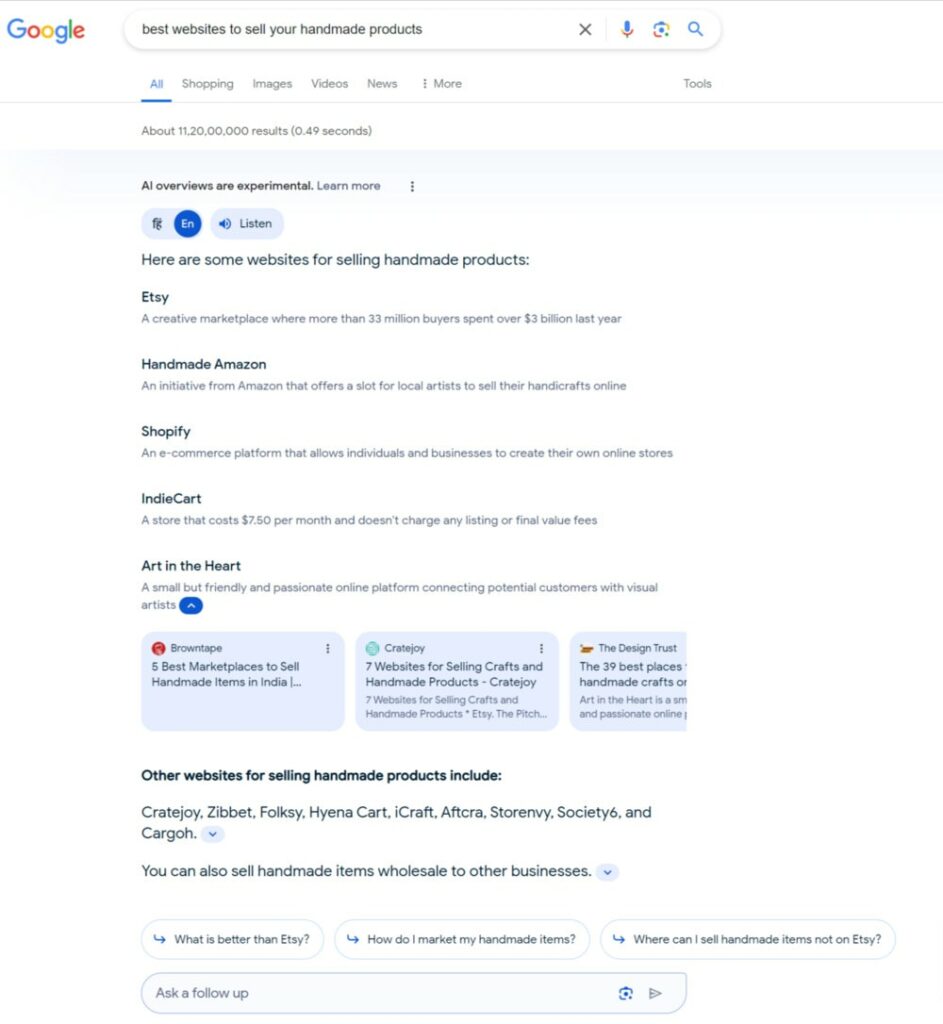
If your article includes valuable information, Google might feature snippets in their SGE results as well, as you can see above.
In this article, we’ll discuss:
- What AI SEO is
- How AI is evolving search engine algorithms and optimization strategies
- The role of AI in SEO keyword research, content creation, and optimization
- The best AI-powered tools to propel your website toward higher search rankings
- Ethical considerations and practical tips for beginners
Whether you're a seasoned SEO professional or just starting your journey, this guide on AI SEO is a must-read. Let’s dive in!
What is AI SEO? How is It Different From Traditional SEO?
AI SEO refers to using artificial intelligence (AI) to optimize your website and content for search engine results pages.
While traditional SEO has been the foundation of online success for years, AI SEO takes it a step further by using AI to automate tasks, gain deeper insights, and optimize your strategy for maximum impact.
Here's a quick comparison to summarize the key differences between traditional SEO and AI SEO:
Traditional SEO | AI SEO | |
Approach | Manual | Automated and data-driven |
Keyword research | Basic research to find relevant keywords that users search for and strategically incorporate them into your content | Advanced research, uncovering long-tail keywords with high potential and the specific search intent (what users are looking for) behind those queries |
Content creation | Manual crafting of high-quality, informative content that targets keywords and provides value to your audience | Assisted with AI tools that can analyze top-ranking content, generate SEO content briefs and outlines, suggest improvements, and optimize your content for readability and natural language processing (NLP)-based keyword inclusions |
User experience (UX) | Manual optimization | Personalized based on user behavior and predictive data, leading to higher engagement and conversions |
Search algorithms focus | Keyword matching | Overall website optimization and user experience |
The Impact of AI on Search Engine Algorithms
In the past, search engine algorithms relied heavily on keyword matching. If your website contained the exact keywords a user searched for, it had a higher chance of ranking well.
However, AI algorithms are moving beyond simple keyword matching. They now strive to understand the search intent behind a query.
For example, if a searcher uses the keywords “best laptops for students,” they're not just looking for a list of laptops. They're likely interested in affordable laptops suitable for specific purposes like programming or a Master's degree.
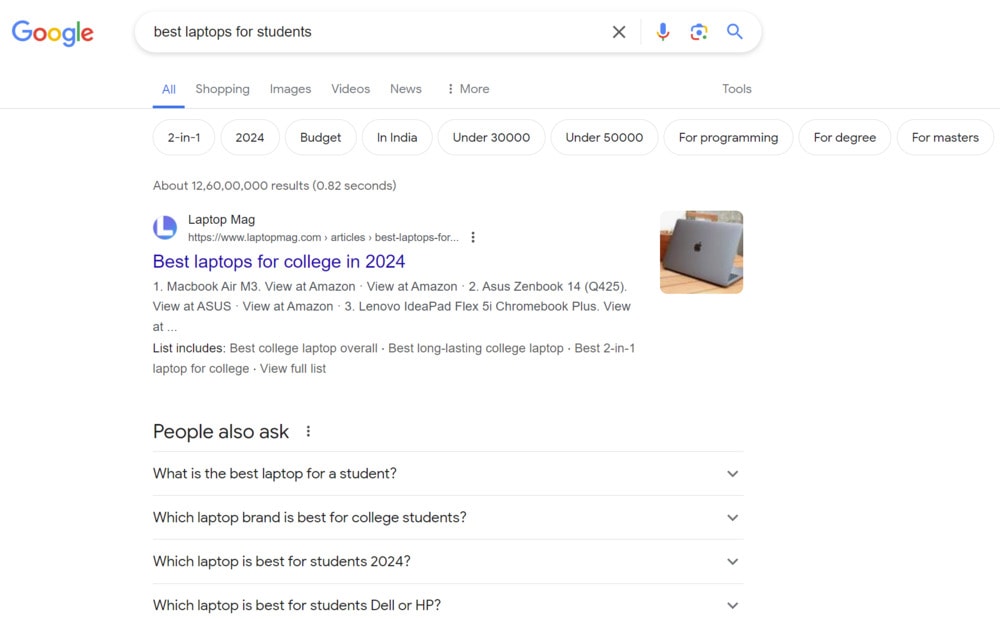
Google now delivers results that truly address the search intent.
AI algorithms can also analyze factors like content structure, readability, and user engagement metrics to identify high-quality content that deserves higher rankings.
They analyze how users interact with websites and favor websites with a positive user experience (UX), such as fast loading times and a mobile-friendly design.
AI allows search engines to personalize search results based on the individual search history, location, and preferences. It means that two users searching for the same term might see different results to suit their unique needs.
Here’s how different AI algorithms influence search results:
- RankBrain: Google’s AI system interprets queries, understands context, and refines search results.
- BERT (Bidirectional Encoder Representations from Transformers): BERT analyzes the context of words in a query, improving natural language understanding.
- Content quality assessment: AI evaluates content relevance, readability, and uniqueness.
What Are the Benefits of Using AI for SEO?
AI isn’t just a buzzword; it’s a game changer.
Here’s why integrating AI into your SEO efforts is crucial:
- Well-refined SEO ranking factors: Search engines now consider user intent, context, and personalization while ranking web pages – all thanks to AI.
- Apt keyword research: Gone are the days of generic keyword lists. AI tools can accurately analyze vast amounts of data to suggest valuable long-tail keywords that people are searching for along with their search intent.
Semrush helps you uncover niche keywords with high search volume and low competition – a goldmine for targeted traffic.
Rank Math and Surfer SEO highlight NLP-based related terms you should add to your content to optimize it for higher rankings. - Better understanding of your audience: AI tools can analyze user behavior to help you tailor your content to their needs and interests.
- Dynamic content creation: Although AI isn’t here to replace human creativity, using AI content generators analyzes top-ranking content, generates outlines, writes copy, and suggests improvements, saving you precious time and effort.
Semrush’s SEO Writing Assistant (SWA) and Jasper churn out blog posts, product descriptions, and social media copy with basic prompts. - Better content personalization: AI-driven content recommendations ensure your articles resonate with your audience.
- Reliable predictive analytics: AI analyzes historical data to predict future trends, helping you stay ahead of the curve.
- Enhanced user experience: AI helps optimize your website UX, leading to better engagement and improved rankings.
- Efficient automation: Repetitive tasks like meta tag optimization and content brief creation become a breeze with AI.
The Best Practices for Using AI in Search Engine Optimization
AI excels at automating tasks, analyzing vast amounts of data, and identifying patterns we might miss. Here’s how you can use AI for SEO and content marketing success:
How to Use AI for SEO Keyword Research
Keyword research remains the foundation for a successful SEO strategy. But gone are the days of relying solely on intuition and guesswork.
Artificial intelligence (AI) analyzes vast search data to identify specific, long-tail keywords with high-ranking potential. These niche phrases go beyond broadhead terms, targeting users further along the buying journey.
These keywords are hidden gems – a goldmine for targeted traffic that converts!
Use Semrush’s Keyword Magic tool to find related keywords and questions. You can filter results by setting a minimum search volume criterion and sort results by ascending keyword density. You’ll get long-tail keywords that are comparatively easier to rank for.
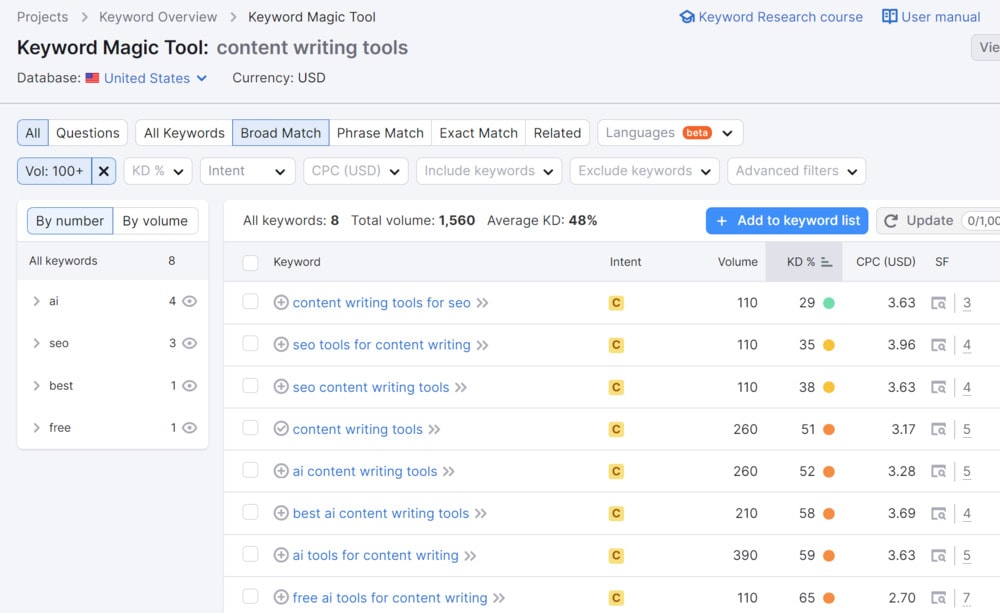
Also, find keyword gaps in your and your competitors’ target keywords using the Keyword Gap tool. It will help you identify keywords you’re missing out on but can rank for.
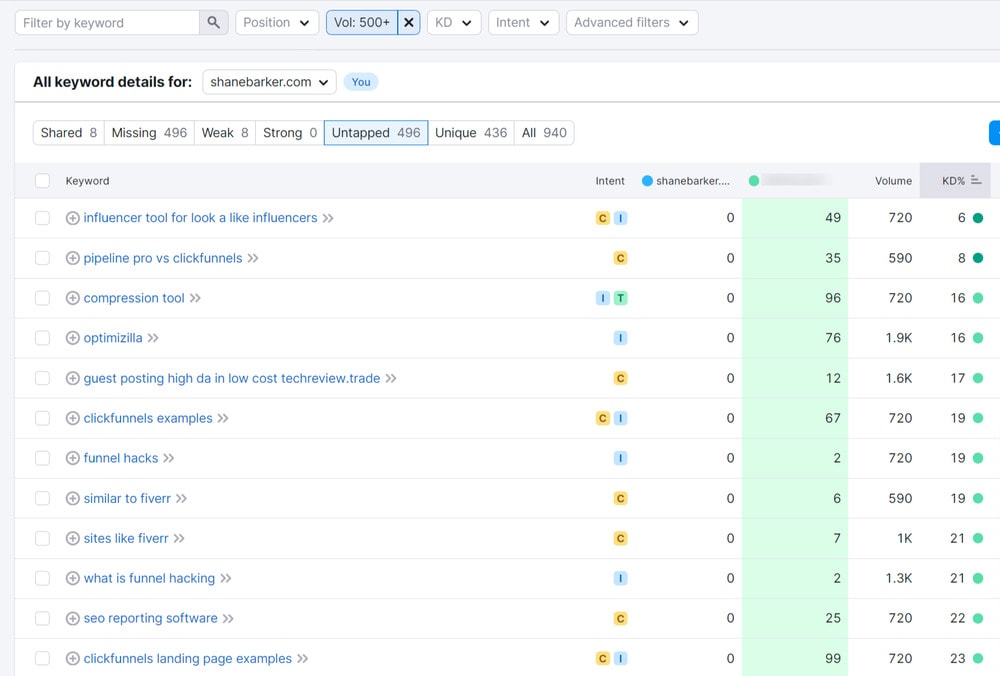
Using AI SEO tools helps you create a comprehensive keyword map, covering all search queries users might type in to find information relevant to your niche.
How to Use AI SEO to Understand Search Intent
AI doesn't just stop at helping you identify keywords with high-ranking potential; it also helps in understanding the “why” behind user searches. By analyzing search patterns and user behavior, AI tools can predict the intent behind a particular query.
Is the user looking for information, a comparison, or ready to purchase?
This crucial insight ensures your content directly addresses their needs and search stage. It also significantly improves your chances of driving conversions through targeted content.
Use ChatGPT or Gemini to understand the context behind each search query and create content that addresses the search intent. It is because Google no longer favors keyword stuffing without offering value to users.
For example:
To create an article that will rank on “best email campaign” keyword searches, use the prompt in the screenshot below.
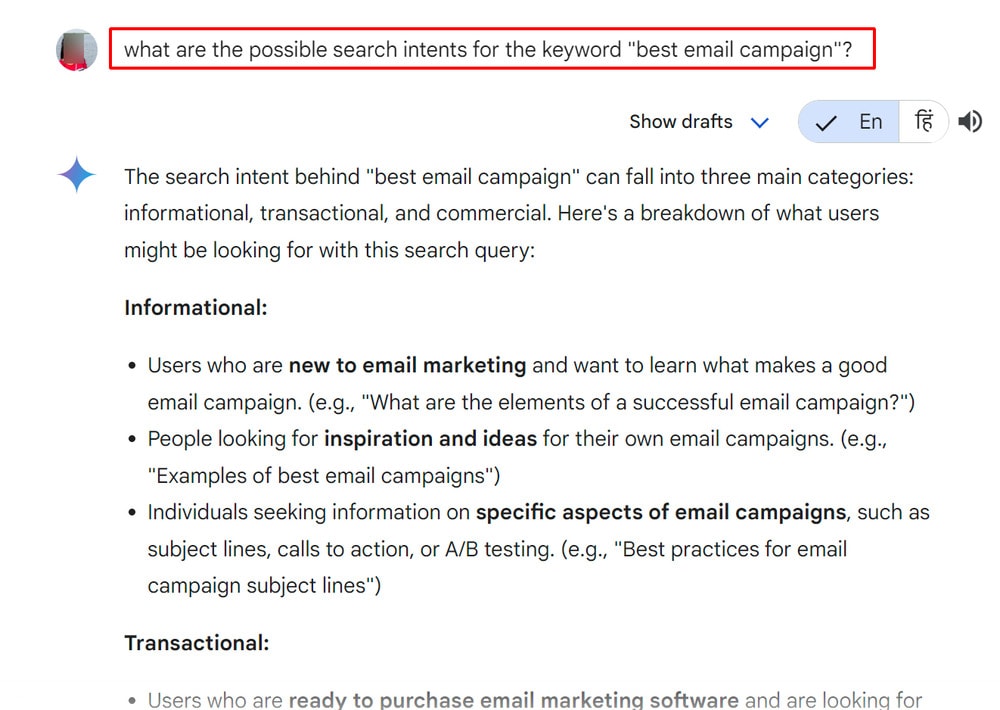
We found that users primarily want to:
- See examples of best email campaigns for inspiration and ideas for their own campaigns.
- Learn what elements make a good email campaign.
- Discover best practices for email subject lines and calls-to-action (CTAs).
- Get recommendations for the best email marketing platforms, comparing their features and pricing.
Understanding these different search intents helps you tailor your content to the specific needs of your target audience.
For example, if you sell subscriptions to an email marketing platform like Brevo or Omnisend, you should create a blog post that provides educational content on best practices and examples while subtly highlighting the features of your platform.
How to Use AI for Content Creation and Optimization
Crafting high-quality, engaging content that ranks well on search engine results pages (SERPs) can be a time-consuming challenge. Thankfully, AI is here to lend a hand.
AI tools like Semrush’s Topic Research tool help you find content ideas that resonate with your target audience.
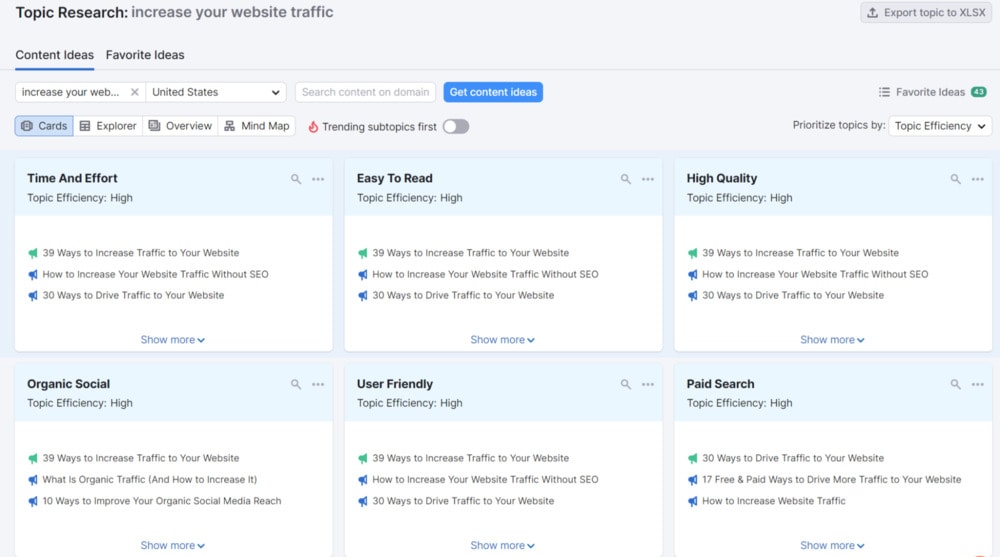
Gone are the days of staring at a blank page.
Now, AI can help you create content outlines by analyzing the top-performing content on specific target keywords. It suggests relevant topics, angles, titles, and subheadings to guide your content creation process.
I use Semrush’s Content Template and SEO Writing Assistant for creating SEO-friendly content. Surfer SEO and Jasper are also quite popular and powerful choices for high-ranking AI-generated content.
These AI-powered tools offer recommendations based on the top 10 search results for your target keyword, including:
- Semantically related words to include in your content
- Recommended article length or word count
- Average readability score of top 10 competing articles
- Websites to acquire backlinks from for boosting authority
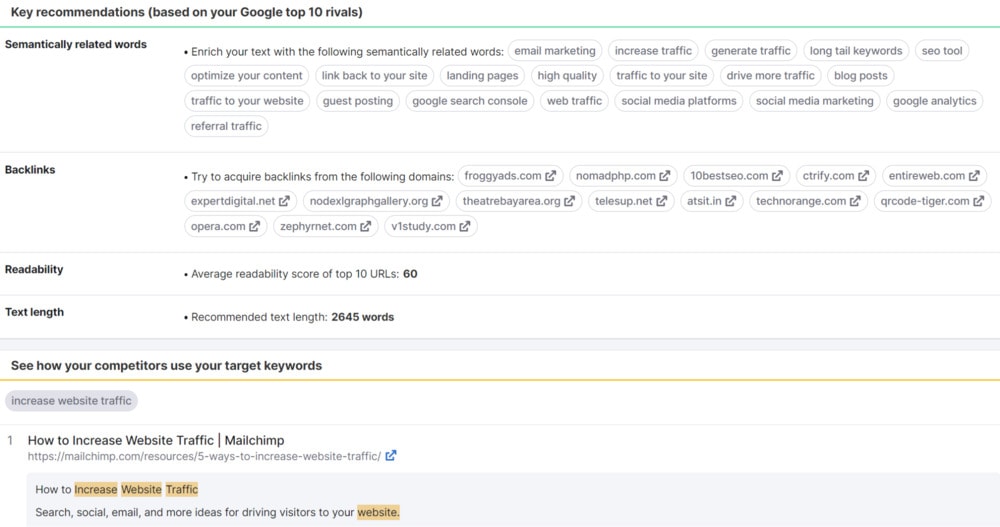
You can analyze your content in real-time with Semrush’s SWA and Surfer SEO’s Content Editor to identify and fix issues like:
- Complex sentence structures
- Content flow issues
- Lack of target keywords
- Poor readability
- Grammar and spelling errors
- Image alt text issues
- Passive voice usage
- Plagiarism issues
- Inconsistency in tone of voice
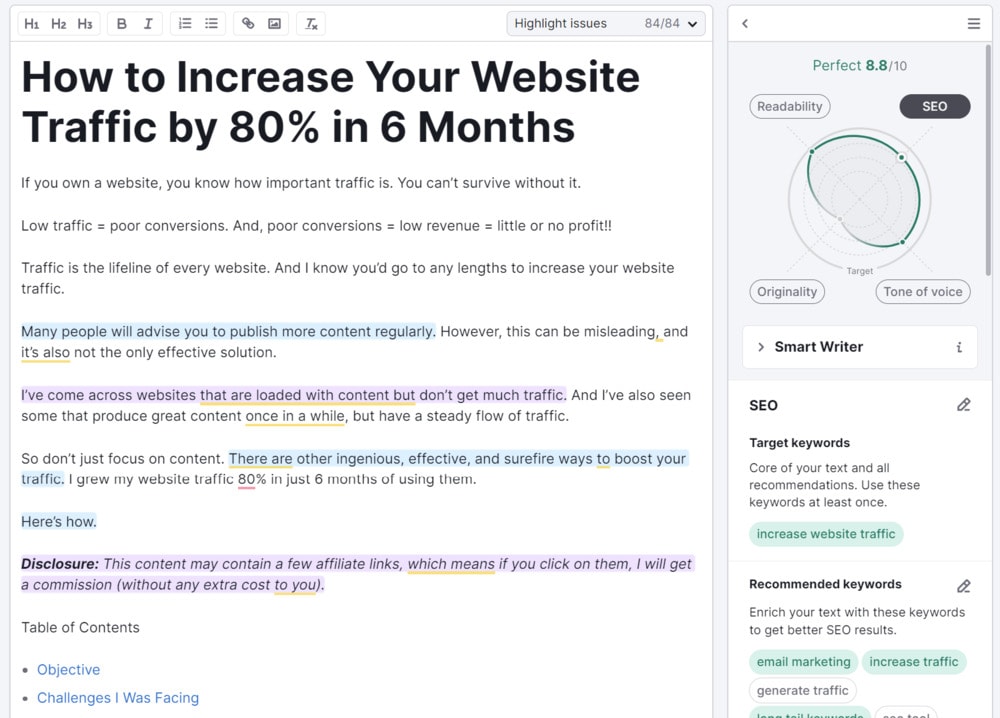
This not only helps improve user experience but also avoids potential penalties from search engines for low-quality content. You easily optimize your content for various ranking factors and to resonate with your target audience, leading to higher engagement and conversions.
The use of these AI SEO content tools is not limited to new content creation. You can also leverage them to optimize your low-ranking content.
A good practice is to check pages that rank 5-10 in search engine results and optimize them for higher rankings. This tactic can significantly improve your SEO results and increase your website traffic.
How to Use AI to Optimize User Experience (UX)
Good user experience (UX) is no longer a “nice to have” element; it is a crucial ranking factor for search engines.
Google prioritizes websites that offer a seamless, engaging experience for users. You can use artificial intelligence (AI)-powered tools to:
- Analyze user behavior on your website through heat maps and session recordings with tools like Hotjar.
- Identify pain points like confusing navigation or slow loading times and fix them.
- Optimize your website layout, content placement, and internal links for a more intuitive and user-friendly experience.
- Personalize content based on user behavior and browsing history to keep them engaged and help them find the information they need more efficiently.
- Deploy AI-powered chatbots and virtual assistants to answer user questions, solve basic problems, and offer personalized product recommendations.
- Test your website for accessibility issues like proper color contrast or screen reader compatibility.
- Create multilingual versions of your website content using AI-powered translation tools to cater to a global audience and improve user experience.
By optimizing your user experience (UX) with AI, you'll see a positive impact on your SEO in several ways:
- Increased dwell time: When users find your website easy to navigate and engaging, they're more likely to stay longer, which is a positive ranking factor for search engines.
- Reduced bounce rate: You can eliminate user frustration and reduce bounce rates (users leaving immediately).
- Improved conversion rates: A well-optimized UX not only improves SEO but also leads to higher conversion rates, whether it's sign-ups, purchases, or other desired user actions.
Getting Started with AI SEO Ethically and Responsibly
While AI provides powerful insights into target keywords, SEO, content creation, and UX optimization, you should value human expertise.
It’s important to strike a balance between AI-driven SEO and maintaining authentic, user-first content. You should focus on creating valuable, informative content that addresses search intent and solves user’s problems.
Let AI be your assistant, not your replacement.
Here are some practical tips for using AI for SEO ethically:
- Experiment with AI-powered tools, from keyword research to content creation tools. Explore free trials and demos to find ones that suit your needs and budget. Popular options include Semrush, Surfer SEO, and SE Ranking.
- Focus on user intent: Don't get caught up in keyword rankings. Use AI to understand the “why” behind user searches and tailor your content to answer their unique questions and needs.
- Maintain a human touch: While AI can be a powerful tool, remember that SEO is ultimately about connecting with real people. Prioritize creating content that resonates with your audience on a human level.
- Don't be too reliant on AI suggestions: Use AI insights as a guide, not a gospel. Analyze recommendations critically and make informed decisions based on your own expertise, brand voice, and target audience.
- Maintain transparency: Don't publish AI-generated content for quantitative outputs. Focus on quality and leverage AI for optimization and efficiency.
- Stay updated on AI trends: The landscape of AI SEO is constantly evolving. Stay updated on the latest trends and tools to ensure your strategies remain effective.
The Future of AI and SEO
The influence of AI on search engine algorithms is only going to grow. Here are some potential future trends to consider:
- Predictive search: AI might be able to anticipate user needs and deliver results before they even type in a full query.
- Focus on expertise and authority: AI algorithms might focus more on a website's overall knowledge and authority in a particular field.
- Evolving user engagement signals: AI might go beyond clicks and analyze more nuanced user engagement metrics like time spent on a page or social shares.
Are You Ready to Embrace AI for SEO Success?
The future of SEO is AI-driven, but human expertise will always be crucial. By embracing AI as a valuable partner, you can create a winning SEO strategy that delivers long-term success.
Treat AI as your ally. Embrace it, experiment, and watch your rankings soar. Share your experiences using SEO tools and AI prompts in the comments below.
P.S. Explore Semrush and other AI SEO tools as your trusty companions.
FAQs
How to do SEO with ChatGPT
Here's how to leverage ChatGPT effectively for SEO:
– Provide ChatGPT with a seed keyword and ask it to suggest related long-tail keywords and potential content angles.
– Ask ChatGPT to create a basic outline for your content, including headings, subheadings, and potential talking points. Refine the outline by analyzing the top search results and ensure the outline aligns with your brand voice and target audience.
– Use ChatGPT's suggestions as a starting point, but do your own research and write content in your own voice.
– Avoid keyword stuffing found in AI-generated content. Do line editing to maintain a natural flow and prioritize user experience over keyword density.
– Check AI-generated content for factual errors or inconsistencies. Edit it for clarity and value.
Can AI SEO help my small business website?
Using AI tools for SEO tasks like keyword research, topic research, content creation, content analysis, and optimization, can help your small business website rank for relevant keywords.
However, you should use AI insights as a guide and trust human expertise for high-quality content creation and optimization.


Related Articles
15 Best SEO Tools For All Marketers (Free + Paid Platforms)
Learn How to Do an In-Depth Technical SEO Audit in 9 Steps
20 Best SEO Chrome Extensions That You Need to Know in 2024
8 SEO On-Page Factors That Can Affect Your Search Results Rankings
15 Best SEO Audit Tools
20 Best SEO Plugins for WordPress You Need To Know Right Now